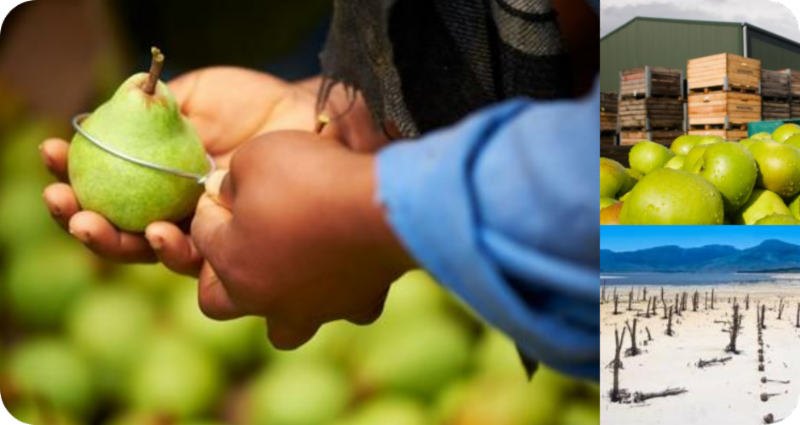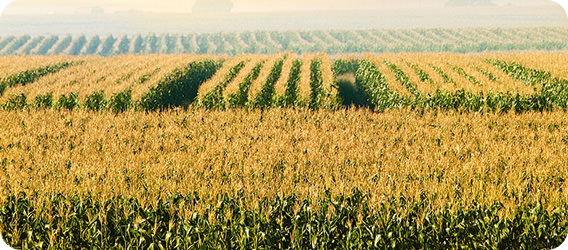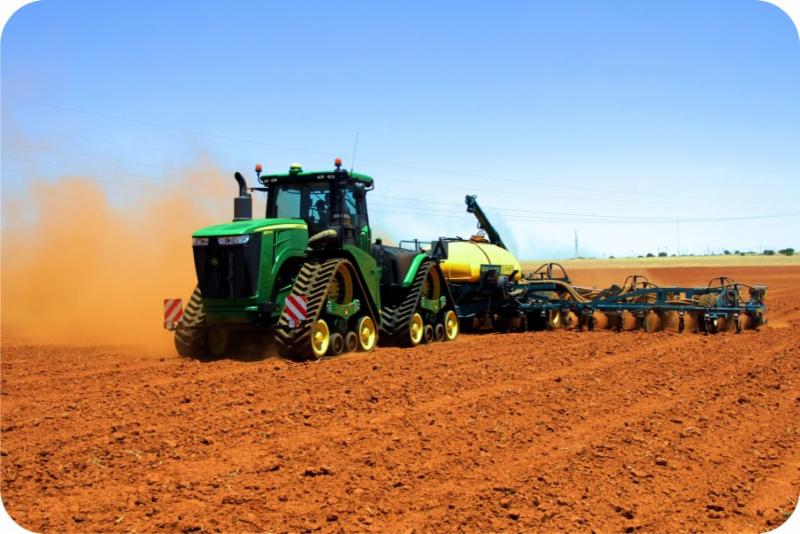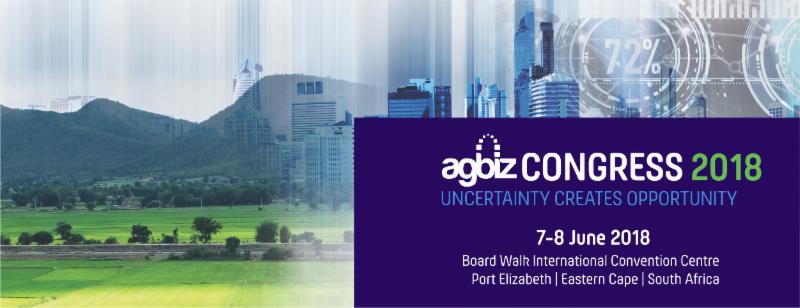This past week the CEO of Agbiz, Dr John Purchase, addressed a number of meetings on various matters, including prospects and challenges facing the agriculture and agribusiness sectors, new policies and legislation impacting on the sector, current agricultural economy and future projections, and of course on expropriation without compensation. Presentations were made to:
- Senior executives of DuPont Pioneer, now Corteva Agriscience after the amalgamation with Dow;
- The Management Committee of PPECB;
- Macquarie and their international investor clients;
- Keynote address at the AGM of the South African Chamber of Baking (SACB);
- Cattleman's Conference of the SA Feedlot Association.
|

Researchers from the Bureau for Food and Agriculture Policy (BFAP) and the Western Cape Department of Agriculture (WCDA), Louw Pienaar and Johann Boonzaaier, this past week released a critical Drought Policy Brief that
highlights the adverse economic consequences of the current drought in the Western Cape on the agricultural sector in order to provide guidance to decision makers in dealing responsibly with this disaster. As is well known by now, the Western Cape is currently experiencing the worst drought in recorded history. The impact of this catastrophe on the provincial economy is exacerbated by the fact that the agricultural and agri-processing sectors combined contribute more than 10% of the Province's GDP and employ around 340 000 workers whose jobs have now become even more vulnerable. These sectors also produce more than half of the net agricultural exports of South Africa at a time when the Rand has been appreciating against almost all of the leading currencies in the world. The analysis shows significant declines in farm output, but also additional income losses as export volumes also decline (currently they are significantly lower (19%) than last year). These export industries are heavily reliant on higher margins and producers have therefore prioritised fruit exports with the available water, whilst in many cases abandoning large areas of vegetable production and other crops with less favourable profitability projections. Please click on Drought Policy Brief and Drought Presentation to peruse full report on the impact of the Western Cape drought.
|

At a conference hosted by the Department of Labour from 13 to 15 of March 2018, the labour inspectors responsible for occupational health and safety discussed the contribution that these inspectors make toward achieving decent work at the workplace. The conference was attended by 190 inspectors and 30 guests.
The Deputy Minister of Labour addressed the conference and indicated that the conference aims to provide a platform to share knowledge and experience. He indicated that 32% of workplaces are not compliant with Health and Safety legislation. He indicated that he was informed that employers budget for fines rather than compliance with the legislation. He said that these practices could lead to much higher fines being imposed.
The Deputy Minister further indicated that the Occupational Health and Safety Amendment Bill is at an advanced stage and will be published for public comments in the near future. Elize van der Westhuizen, representing Agbiz and organised business, was invited to address the conference. Linked is her address»
|
The Agbiz transformation desk assists Agbiz members with information and support related to transformation in the agriculture and agribusiness sector. The revised AgriBEE Sector Code was published in the Government Gazette of 8 December 2017. Agbiz recently hosted two half-day sessions, one in Gauteng and one in the Western Cape, to inform role players and stakeholders how to develop and implement a B-BBEE strategy for their business. Mr Melcus Nel of Signa who serves on the transformation desk provides answers to some questions that he has received:
Question: We have expanded our business into neighbouring African States. Can black managers, employed by companies in said states, who are also citizens of these states, qualify as BEE management and/or shareholders under the Ownership and Management Control elements of the scorecard?
Answer: The answer is no.
Codes:
BEE beneficiaries, as a rule of thumb, are considered to be everyone that was affected by Apartheid. The formal definition in the codes is as follows:
"Black People is a Generic term which means African, Coloureds and Indians:
a) who are citizens of the Republic of South Africa by birth or decent; or
b) who became citizens of the Republic of South Africa by naturalisation -
* before 27 April 1994;
* on or after 27 April 1994 and who would have been entitled to acquire citizenship by naturalisation prior to that date."
Q - Why is the submission of a Workplace Skills Plan (WSP) and an Annual Training Report (ATR) important for the BEE scorecard?
Answer: The submission of WSP, ATR and Pivotal Reports are pre-conditions for scoring points with the Skills Development element.
Codes:
The Skills Development Element of the BEE scorecard carries the following principles and is applicable because of the reference to it under point 7.4.3 of the AgriBEE scorecard:
KEY MEASUREMENT PRINCIPLES
The following criteria must be fulfilled in order for the Measured Entity to receive points on the Skills Development Element scorecard:
-Workplace Skills Plan, an Annual Training Report and Pivotal Report WHICH ARE seta approved; and
-Implementation of Priority Skills programme generally, and more specifically for black people."
*Lees artikel in Landbouweekblad van 5-12 Januarie:
Please forward any questions or enquiries you have to Melcus Nel at [email protected] or contact him on 082 448 0356
|
 The dark clouds of policy uncertainty and climate change are a form that does not put a smile on farmers' faces. However, there are some silver linings along the journey of South African agricultural sector that are worth highlighting. While going through my old photos recently, one shot taken four years ago caught my attention. In it, I was posing with the then Grain SA vice-chairman, Victor Mongoato, looking over the maize fields on the outskirts of Matatiele in the Eastern Cape province. I had been on a visit to a group of thriving black farmers.
Read
Wandile Sihlobo's
linked
Business Day
column.
|
 Subsequent to a solid 10% y/y increase in January 2018, the South African tractor sales fell by 12% y/y last month, with 595 units sold. While February is typically one of the months with the highest tractor sales, just before the end of the financial year, this time around most purchases occurred in January, which explains the softening in last month's activity. On the contrary, the combine harvester sales were up by 11% y/y in February 2018 with 21 units sold. This is partially due to the stronger domestic currency and anticipation of a fairly good 2017/18 summer grain and oilseed harvest. Wandile Sihlobo, Agbiz economist, provides more information in the linked update» Subsequent to a solid 10% y/y increase in January 2018, the South African tractor sales fell by 12% y/y last month, with 595 units sold. While February is typically one of the months with the highest tractor sales, just before the end of the financial year, this time around most purchases occurred in January, which explains the softening in last month's activity. On the contrary, the combine harvester sales were up by 11% y/y in February 2018 with 21 units sold. This is partially due to the stronger domestic currency and anticipation of a fairly good 2017/18 summer grain and oilseed harvest. Wandile Sihlobo, Agbiz economist, provides more information in the linked update»
|
Click here to read the daily market view on commodities and the weekly wrap.
|
| INTERNATIONAL TRADE AND INVESTMENT RESEARCH |

In January 2018, the agricultural sector sprint into a positive net trade of R1.3 billion while the overall economy suffered a trade deficit of R27.67 billion. The positive agricultural trade balance can be attributed to the availability of quality summer fruits and beverage products coupled with improved demand in Europe for South African agricultural products. On the imports side, South Africa still source relative large quantities of rice, oilcakes and processed food from Asia and other markets.
Sifiso Ntombela, trade economist and Head Agbiz International trade and investment research, provides more information in the
linked article»
|

Aside from challenges such as policy uncertainty and climate change, role players in agriculture are of the opinion that there are some factors that count in favour of the agricultural sector. With regard to South Africa's trade balance, South Africa's exports exceeded the 10 billion dollar mark for the first time last year. Sifiso Ntombela, trade economist and Head Agbiz: International trade and investment research discussed this in a live interview on Grootplaas (DSTV, kykNET, TV channel 144). Click here to watch the full interview on Agriorbit.
|
|

2018 Agbiz Congress | 82 Days to go!
With the agribusiness environment changing constantly, the congress theme "Uncertainty creates Opportunity" will pay attention to the key issues of transformation confronting South Africa and its agriculture system, and the impact technology will have on the competitiveness of South Africa's industries.
This year, we will be adding to our fantastic repertoire of speakers, as well as inviting back some of your favourites, the people that impressed you most over the years - Draft programme
Accommodation at the Boardwalk Hotel in Port Elizabeth where the congress is taking place, is selling out fast but a few rooms are still available - More information
IMPORTANT DATES
Closing date for registration: 4 May 2018
Congress: 7-8 June 2018
Welcome Function: 6 June 2018
Gala Dinner: 7 June 2018
Agbiz AGM: 8 June 2018
|
Landbouweekblad konferensie
Herlewingslandbou is boere se kostedoeltreffende wapen teen stygende insetkoste en klimaatsverandering
19-20 March 2017 | Reitz
GOSA Symposium 2018
22-23 March 2018 | Mossel Bay
More information
International Sorghum Conference
9-12 April 2018 | Cape Town
More information
FERTASA Annual Congress
19 April 2018
Premier Hotel OR Tambo | Johannesburg
6-11 May 2018
NAMPO
15-18 May 2017 | NAMPO Park | Bothaville
More information
21 to 25 May 2018
The Academy of Science of South Africa (ASSAf), The World Academy of Sciences Regional Office for sub-Saharan Africa (TWAS-ROSSA) and the American Association for the Advancement of Science (AAAS) are seeking candidates to participate in the inaugural regional training workshop on science diplomacy to be held in South Africa.
More information
World Potato Congress
27-31 May 2018 | Peru | South America
Vision 2030 Summit
20-21 June 2018 | Emperors Palace | Gauteng
More information
IFAMA World Conference
23-27 June 2018 | Buenos Aires | Argentina
More information
FW Agribusiness Africa Conference
18-19 July 2018 | Emperors Palace
Enquiries: Marianna du Plessis, e-mail [email protected]
PMA Fresh Connections Southern Africa Conference and Tradeshow
15-16 August, 2018 |
CSIR | Pretoria
AGRI 5 Commodities Workshop & Expo
Date: 20th -21st September 2018
Venue: East London Show Grounds
Contact info: 011 056 6856
|
Being a member of Agbiz provides various benefits and opportunities
- Agbiz is the only organisation that serves the broader and common over-arching business interests of agribusinesses in South Africa.
- Agbiz addresses the legislative and policy environment on the many fronts that it impacts on the agribusiness environment.
- Agbiz facilitates considerable top-level networking opportunities so that South African agribusinesses can play an active and creative role within the local and international organised business environment.
- Agbiz research provides sector specific information for informed decision making.
- Agbiz newsletter publishes members' press releases and member product announcements.
|
|
Third-party website links to this newsletter
|
|
The Agbiz Newsletter may contain a few links to websites that belong to third parties unrelated to us. By making these links available, we are not endorsing third-party websites, their content, products, services or their events. Agbiz seeks to protect the integrity of its newsletter and links placed upon it, and therefore welcomes any feedback.
|
|
| |
|
|